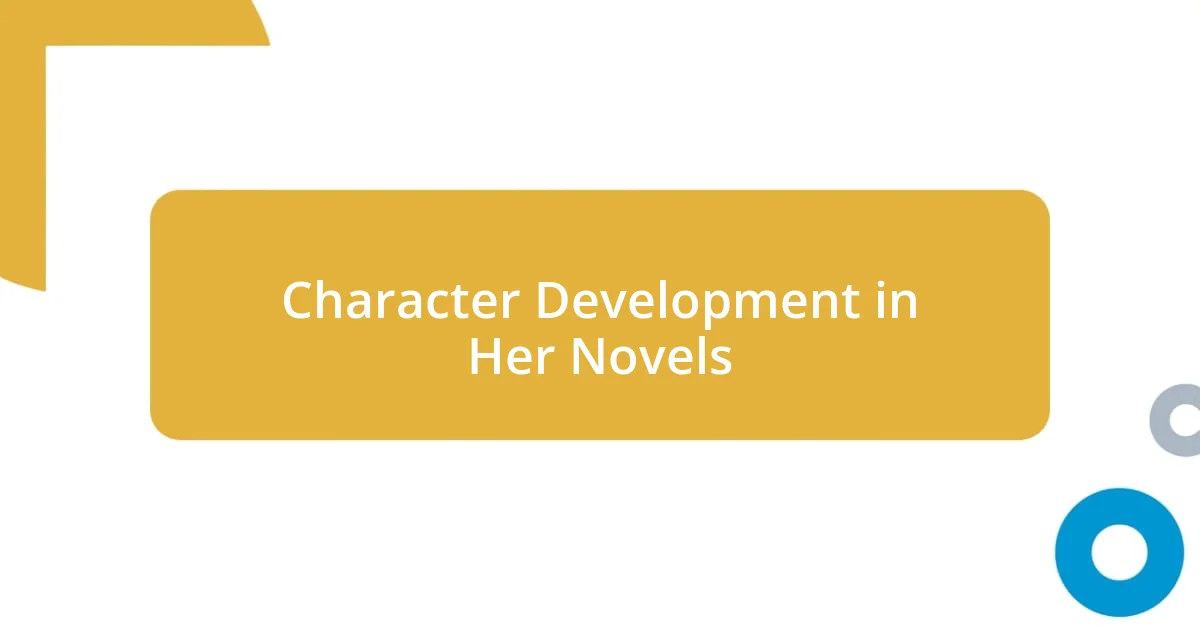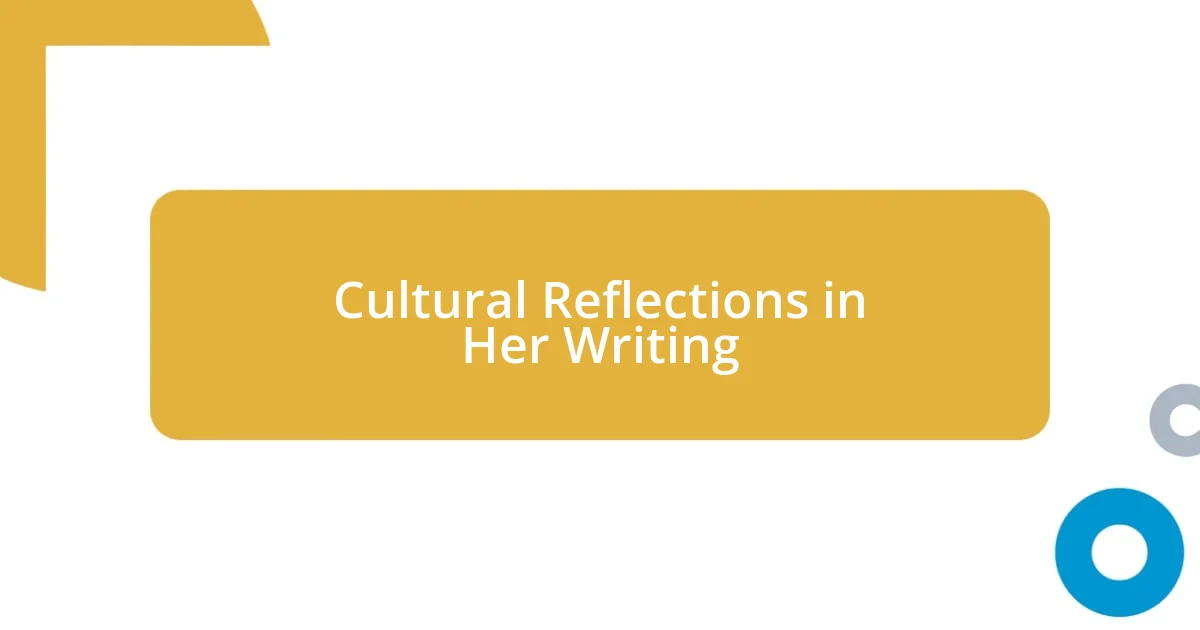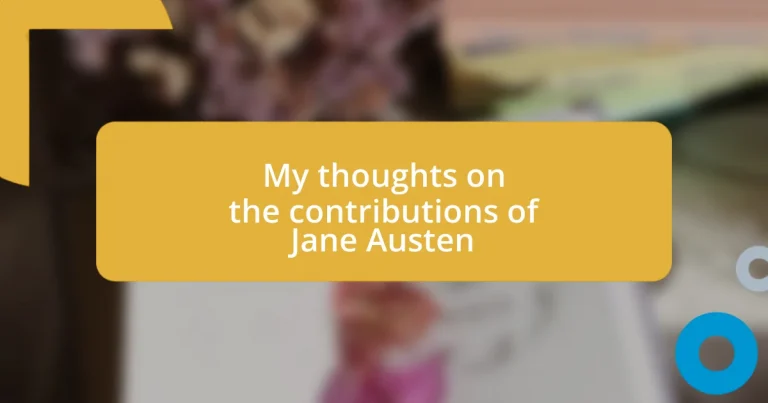Key takeaways:
- Jane Austen’s exploration of themes like marriage, gender inequality, and class dynamics remains relevant, prompting modern reflections on love and societal expectations.
- Austen’s characters exhibit profound growth and self-discovery, resonating with readers’ own journeys and challenges in navigating societal norms.
- Modern adaptations of Austen’s works demonstrate her timeless influence, showing how her narratives continue to engage contemporary audiences through relatable themes and new storytelling formats.

Understanding Jane Austen’s Influence
Jane Austen’s influence resonates across centuries, shaping not only literature but also the societal perceptions of gender and class. I remember reading “Pride and Prejudice” for the first time; the depth of character development and social commentary stirred something deep within me. Have you ever considered how her characters reflect the struggles of women in her era, yet remain relatable to us today?
Her keen observations on social dynamics and relationships make her work timeless. For instance, her exploration of marriage goes beyond mere romantic notions. I can’t help but think about the conversations I’ve had with friends about love and partnership, often echoing Austen’s sentiments about the balance between affection and financial security. Isn’t it fascinating how her insights ripple through our modern discussions on relationships?
Moreover, Austen’s subtle humor and irony add layers to her storytelling. I still chuckle when I recall my first encounter with Mr. Bennet’s wit. It was a reminder that humor can cleverly critique societal norms. Her writing not only entertains but prompts us to reflect on our values and the absurdities around us. How often do we pause to consider the truths behind the laughter in our daily lives?

Key Themes in Austen’s Works
Jane Austen’s works are rich with themes that continue to resonate today. One of the key themes is the exploration of marriage and relationships. I often think back to my university days when my friends and I dissected couples from Austen’s novels, trying to decipher the complexities of love, practicality, and societal expectations. It’s a delicate dance—Austen highlights how often affection is balanced with convenience, where social status plays a significant role.
A few other recurring themes in Austen’s literature include:
- Class and Social Status: The rigid class structures and how they navigate relationships, as seen in “Emma.”
- Gender Inequality: The struggles and limitations imposed on women, as portrayed in “Sense and Sensibility.”
- Personal Growth and Self-Discovery: Characters often experience significant internal development, showcasing their journey toward maturity and understanding, much like Elizabeth Bennet’s evolution in “Pride and Prejudice.”
- Irony and Social Critique: Austen employs irony to comment on societal norms, revealing deeper truths while keeping the reader entertained.
Reflecting on these themes, I find it fascinating how they mirror our contemporary issues. The conversations I’ve had with friends about self-discovery and societal pressures remind me of Austen’s ability to blend personal narratives with broader social commentary. Her insights feel as if they’ve traveled through time, urging us to examine our perceptions of love, status, and personal growth.

Character Development in Her Novels
Austen’s character development is both intricate and revealing, offering readers a glimpse into the human experience. I still remember my first encounter with Emma Woodhouse in “Emma.” I was struck by her complexity; she’s charming yet flawed, and through her misadventures, I found myself reflecting on the times I’ve let my assumptions cloud my judgment. Have you ever had a similar realization after reading about a character’s questionable decisions? It’s a testament to Austen’s skill that we can relate to characters who make mistakes, as it echoes our own struggles with growth.
Moreover, the transformation of characters like Elizabeth Bennet is fascinating to observe. I find it remarkable how Elizabeth’s journey is not only about her relationships but her self-awareness as well. In my own life, I’ve had moments where I thought I knew everything, only to realize later that there was so much more to understand about myself and the people around me. Doesn’t that resonate with the universal theme of self-discovery? Austen captures these nuances beautifully, making her characters feel genuine and their journeys impactful.
Austen’s women are often portrayed facing societal constraints yet they navigate their worlds with resilience. I’ve had countless discussions with friends about how Austen’s heroines challenge norms, which is particularly inspiring. For example, Marianne Dashwood’s struggle in “Sense and Sensibility” highlights the clash between passionate love and societal expectations. Reflecting on our own experiences with love and expectations, it’s easy to draw parallels between her fictional worlds and the real challenges we face in our lives.
| Character | Development Highlights |
|---|---|
| Emma Woodhouse | Begins as manipulative and self-assured but learns humility and deep self-awareness. |
| Elizabeth Bennet | Initially prejudiced, she evolves to understand herself and others, experiencing true growth. |
| Marianne Dashwood | Embodies romantic idealism and matures through heartbreak, balancing emotions with reality. |

Austen’s Impact on Feminism
Reflecting on Austen’s impact on feminism, I feel it’s essential to recognize how her characters embody the struggles of women in a patriarchal society. For instance, while reading “Pride and Prejudice,” I couldn’t help but admire Elizabeth Bennet’s defiance against societal norms. She doesn’t just accept her fate; instead, she asserts her right to choose love on her terms. Have you ever felt that urge to stand your ground in a situation where expectations were heavily stacked against you?
Austen’s satirical lens critiques the limited options available to women of her time, urging readers to consider the broader implications of gender roles. I vividly recall discussions with my book club about how in “Emma,” the titular character exudes confidence and autonomy. Yet, her journey reveals the complexities of independence within restrictions. It makes me wonder: how many women today still navigate similar constraints while seeking self-fulfillment?
The way Austen intertwines her narrative with feminist ideals is nothing short of revolutionary. When I first encountered the spirited conversations between her heroines and their male counterparts, it sparked something within me. Those dialogues challenge not just the characters’ realities but ours, too, pushing us to ask: are we truly free in our relationships and choices? Austen subtly invites us to contemplate gender equality long before the modern feminist movements emerged, making her work remarkably relevant.

Cultural Reflections in Her Writing
Austen’s work serves as a mirror reflecting the cultural norms of her time, particularly regarding class and marriage. Reading “Pride and Prejudice,” I often found myself pondering the intricate dance of social status and personal choice. Elizabeth Bennet’s rejection of Mr. Collins wasn’t just a comedic moment; it was a bold statement against the expectation that women marry for monetary security rather than love. Have you ever felt the pressure of conforming to roles dictated by society? I think it’s fascinating how Austen subtly encourages her readers to question those societal constraints.
Through her witty observations, Austen shines a light on the limited realities women faced in the 18th century. I still recall my amazement when I understood that characters like Jane Eyre and Elizabeth Bennet were advocating for a kind of freedom that was scarcely accessible to women of that era. The nuanced humor in “Emma” reveals the absurdities of class distinctions while showcasing how ambition could sometimes clash with social decorum. It raises a provocative question: do we still prioritize societal expectations over genuine happiness in our own lives?
Her novels, rich with social commentary, also delve into the nuances of human relationships. When I read “Sense and Sensibility,” I couldn’t help but reflect on how Elinor Dashwood balances societal pressures with her emotional needs. It reminds me of moments in my own life when I felt torn between what was expected of me and what my heart genuinely desired. Doesn’t it resonate with your experiences too? Austen’s ability to weave personal struggles within a broader cultural framework not only entertains but invites us to engage in deeper conversations about our own values and relationships.

Modern Adaptations of Austen’s Works
Modern adaptations of Jane Austen’s works showcase her timeless themes in fresh and engaging ways. I remember watching “Bridget Jones’s Diary” for the first time and being delighted by how it lifted the essence of “Pride and Prejudice” into a contemporary setting. Seeing Elizabeth Bennet’s struggles with love and self-acceptance mirrored in Bridget’s chaotic life made me realize just how relatable Austen’s characters remain today. Have you ever found a connection to a classic story in something modern? It’s a beautiful reminder that the core of human emotions transcends time.
Then there are adaptations like “The Lizzie Bennet Diaries,” a web series that reimagines Austen’s narrative through vlogs. I was captivated by how this format allowed Lizzie to express her thoughts in real-time, making her inner conflicts palpable. It’s fascinating—by choosing a medium like this, the creators not only honor Austen’s wit but also engage a new audience. Watching Lizzie articulate her struggles with love and societal expectations felt incredibly relevant, highlighting that even in our digital age, the quest for identity remains complex. Isn’t it amazing how a modern twist can breathe new life into classic narratives?
Another striking example is the novel “Austenland” by Shannon Hale, which combines a love for Austen’s world with a quirky storyline. As I read about the protagonist finding an escape into a fantasy resembling Austen’s novels, I was reminded of my own penchant for immersing myself in stories. It made me think: isn’t it intriguing how we all sometimes yearn for a slice of that romance, that certainty, which Austen portrays so beautifully? These adaptations serve not just to entertain but also to challenge our perceptions of love, identity, and societal expectations, proving that Austen’s insights continue to resonate in our ever-changing world.














